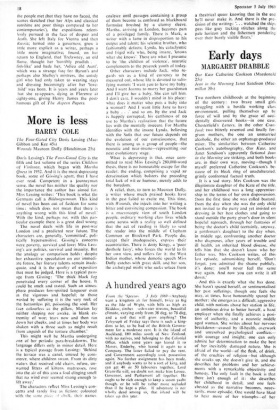More is less
BARRY COLE
The Four-Gated City Doris Lessing (Mac- Gibbon and Kee 45s) Wounds Maureen Duffy (Hutchinson 25s) Doris Lessing's The Four-Gated City is the fifth and last volume of the series Children of Violence, which began with Martha Quest in 1952. And it is the most depressing book, some of Gissing's apart, that I have ever read. Competent in a journeyman sense, the novel has neither the quality nor the importance the author has aimed for. Miss Lessing writes: 'This book is what the Germans call a Bildungsroman. This kind of novel has been out of fashion for some time: which does not mean that there is anything wrong with this kind of novel.' With the kind, perhaps no; with this par- ticular example there is a great deal wrong.
The novel deals with life in post-war London and a predicted near future. The characters are, generally, 'committed', poli- tically hypersensitive. Gissing's concerns were poverty, survival and love; Miss Less- ing's are politics, survival and insanity. But the analogy or comparison holds: despite her exhaustive speculation on our immedi- ate future, her literary talents remain inade- quate, and it is the quality of exposition that must be judged. Here is a typical pass- age from Gissing: 'The thick black fog penetrated every corner of the house. It could be smelt and tasted. Such an atmos- phere produces low-spirited languour even in the vigorous and hopeful; to those wasted by suffering it is the very reek of the bottomless pit, poisoning the soul. Her face colourless as the pillow, Marian lay neither sleeping nor awake, in blank ex- tremity of woe; tears now and then ran down her cheeks, and at times her body was shaken with a throe such as might result from anguish of the torture chamber.'
This might well be Martha undergoing one of her periodic para-breakdowns. The language differs only in minor detail. Here is a typical passage from Lessing: 'Behind the terrace was a canal, unused by com- merce, where children swam. From its dirty waters that received old chairs, refuse, un- wanted litters of kittens. mattresses, rose into the air of this area a foul clinging smell that no wind ever seemed strong enough to lift away.'
The characters reflect Miss Lessing's con- cerns and rarely live as fiction: coloured with the came piece of eh•rlk. their names
coalesce until passages containing a group of them become as confused as blackboard formulae brushed by a clumsy sleeve. Martha, arriving in London, becomes part of a privileged family. There is Mark, a writer with a fame in disproportion to his output and talent; his scientist brother, who fashionably defects; Lynda, his cataclysmic and frigid wife who, being insane, 'knows what she knows'. There are what I presume to be 'the children of violence, neurotic complements to the peacock youth of today.
Other characters include Jack, who re- gards sex as a kind of currency to be measured out, whose life is devoted to satis- fying women: '1 want you to have my baby. And I want Joanna to marry her guardsman and give her a baby. She can tell him, 1 don't care. I wouldn't mind in his place: what does it matter who puts a baby into a woman? And I want little Jane to have a baby . . .' and so on. By the end Jack is happily corrupted, his earthiness of no use to Martha's realisation that the future lies with the mentally insecure. For Martha identifies with the insane Lynda, believing with the Sufis that our future depends on the evolution of our consciousness, that there is among us a group of people—the neurotic and near-insane—representing our next evolutionary stage.
What is depressing is that, once com- mitted to read Miss Lessing's 280,000-word thesis, there is no honourable escape for the reader; the ending, comprising a vapid SF deracination which bolsters the preceding total lack of wit or humour, merely adds to the boredom.
A relief, then, to turn to Maureen Duffy, a writer whose much praised books have in the past failed to excite me, This time, with Wounds, she injects into her writing a bitter and convincing compassion. The book is a macroscopic view of south London people, ordinary working class lives which come across with a reality so well defined that the act of reading is likely to send the reader into the middle of Clapham Common or Brockwell Park. People die, accept their inadequacies, express their eccentricities. There is dotty Kingy, a 'poor dusthole fairy', who forces the world to fit her own view, and suffers for it; the West Indian mother, whose demotic speech Miss Duffy catches with great skill, and her son, the archetypal misfit who seeks solace from
a theatrical queer knowing that in the end he'll never make it. And there is the pre- cision of the writing: watched the ships pass like grey tacking stitches along the pale horizon and the fishermen pondering over their barely visible floats.'


































 Previous page
Previous page